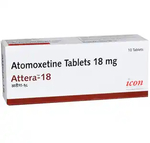attentrol
Introduction to Attentrol
Attentrol is a medication primarily used to treat Attention Deficit Hyperactivity Disorder (ADHD) in children and adults. It helps improve focus, attention span, and impulse control in individuals diagnosed with ADHD. By enhancing the levels of specific neurotransmitters in the brain, Attentrol aids in reducing symptoms associated with ADHD. This medication is available in various forms, including tablets and capsules, making it convenient for patients to choose the form that best suits their needs. It is important to use Attentrol under the guidance of a healthcare professional to ensure its effectiveness and safety.
Composition of Attentrol
The active ingredient in Attentrol is Atomoxetine, which is available in a 10mg dosage. Atomoxetine is a selective norepinephrine reuptake inhibitor (NRI) that works by increasing the levels of norepinephrine, a neurotransmitter, in the brain. This increase helps improve attention and focus while reducing impulsive behavior and hyperactivity. Atomoxetine's unique mechanism of action makes it an effective treatment option for managing ADHD symptoms, providing a non-stimulant alternative to other ADHD medications.
Uses for Attentrol
- Improves attention span in individuals with ADHD.
- Enhances focus and concentration.
- Reduces impulsive behavior.
- Decreases hyperactivity in children and adults.
- Provides a non-stimulant alternative for ADHD treatment.
Side Effects of Attentrol
- Nausea and vomiting.
- Decreased appetite.
- Fatigue and drowsiness.
- Dry mouth.
- Dizziness.
- Insomnia.
- Increased heart rate.
- Possible mood swings or irritability.
Precautions of Attentrol
Before starting Attentrol, it is crucial to discuss your medical history with a healthcare provider. Inform them about any pre-existing conditions, such as heart problems, liver issues, or mental health disorders. Avoid consuming alcohol while taking this medication, as it can exacerbate side effects. Additionally, Attentrol may interact with other medications, so ensure your doctor is aware of all the medications and supplements you are currently taking. Pregnant or breastfeeding women should consult their healthcare provider before using Attentrol. Regular monitoring of blood pressure and heart rate is recommended during treatment.
Conclusion
Attentrol, with its active ingredient Atomoxetine, offers an effective solution for managing ADHD symptoms. Available in tablet and capsule forms, it provides flexibility for patients. However, it is essential to use this medication under medical supervision to ensure its safety and effectiveness. By understanding its uses, side effects, and necessary precautions, patients can maximize the benefits of Attentrol while minimizing potential risks. Always consult with a healthcare professional before starting or adjusting the dosage of Attentrol.
Similar Medicines
Available in 5 variations

Attentrol 10mg Capsule 10s
strip of 10 capsules

Attentrol 25mg Capsule 10s
strip of 10 capsules

Attentrol 40mg Capsule
Attentrol 40mg Capsule
strip of 10 capsules

Attentrol 15mg Tablet
Attentrol 15mg Tablet
strip of 10 tablets
Attentrol 18 Capsule 10s
strip of 10 capsules
Related Faqs

What medicine should be avoided along with Axepta 25mg Tablet?
Avoid taking any other anti-depressant along with Axepta 25mg Tablet without consulting your doctor. This is because the combination may cause side-effects like shaking (tremor), shivering, muscle stiffness, fever, rapid pulse, rapid breathing or confusion.

What medicine should be avoided along with Axepta 40mg Tablet?
Avoid taking any other anti-depressant along with Axepta 40mg Tablet without consulting your doctor. This is because the combination may cause side-effects like shaking (tremor), shivering, muscle stiffness, fever, rapid pulse, rapid breathing or confusion.
Related Posts

1:15
Get a brain boost with these sunflower seed recipes

1:15
What is Stone Man Syndrome?

1:15
How Do You Know If You Have a Vaginal Infection? Warning Signs!

1:15
Top Health Benefits of Cinnamon | How to Use It for Better Health!

1:15
Is Your Blood Pressure Too Low? What Are the Best Remedies to Fix Low Blood Pressure Instantly?

1:15
Mala D: How it works, When and How to take Mala D and Side Effects of Mala D!

1:15
Reduce Inflammation Naturally: Best Foods for Heart, Diabetes & Overall Health!
Disclaimer : This information is not a substitute for medical advice. Consult your healthcare provider before making any changes to your treatment . Do not ignore or delay professional medical advice based on anything you have seen or read on Medwiki.
attentrol
Prescription Required
Manufacturer :
Sun Pharmaceutical Industries LtdComposition :





















.svg)
